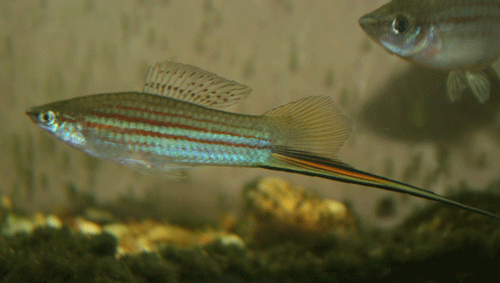The photo is of an adult male Xiphophorus mayae.
This is a wild swordtail species we acquired in 2012 at the American Livebearer Association (ALA) convention auction in Fort Lauderdale. ALA’s annual convention auction offers a great chance of picking up unusual and rare livebearers. The 2014 convention is in St. Louis. I’ll be there speaking twice, once about hatchery operations and another time about breeding techniques. For information about the convention click here.
We raise Xiphophorus mayae exactly as we do other livebearers. We set up a half dozen males with 40-50 females in a 55 gallon vat. In the vat we place some hornwort (Ceratophyllum demersum), a rootless, floating plant. We also place a breeding cage in the center of the vat. We make breeding cages using ¼” aquaculture netting formed into a cylinder about 12” in diameter with a bottom. The cage is tall enough that the top extends a few inches above the water level. The hornwort and the breeding cage provide adequate cover for fry. Like most swords, especially the males, this fish is a fantastic jumper. We keep the vat’s water level low so they don’t all jump out.
The breeders are left in the vat for about two months when they are moved to another vat. The fry and juveniles are left another two months to mature.


Chuck says
I have some fry. How long until they are sexually mature?
charles says
Chuck,
In our system during the summer, they reach sexual maturity at about three months. At cooler temperatures and less food than we give them, it’ll take maybe six months.
Charles
Hijos says
Generally, yes. African cichlids will claim teitrrrory and normally harass south american cichlids to death. You might be able to put a convict in there. The only problem is that if your tank is too small the african cichlids will kill the convict because there is not enough room to swim and the africans have teeth that do a lot of damage when they attack another fish. LOTS OF ROCKS AND OPEN SWIMMING SPACE IS A MUST>
Thomas says
are any of these available for sale. Thanks
Tom
Charles Clapsaddle says
Thomas,
No, unfortunately we lost this species in the Texas Winter Storm. For more about that disaster, visit our YouTube channel. You can start with this video, but there are many others chronicling our losses and recovery.
Charles